Adelaide Road Presbyterian Church has stood for almost 200 years in the heart of Dublin city. Sharing a road with embassies and global law firms, it backs on to the city’s Grand Canal and sits an equally brisk walk from the Dáil – where Ireland’s political power resides – and the complex of offices that are home to Google, Facebook and many other tech giants – the base of Ireland’s economic power. It is one of the most well-established churches in the Dublin and Munster Presbytery, both in terms of its historic legacy and its contemporary vitality. A diverse congregation gathers each Sunday – and throughout the week – to praise and worship, to study the Bible, to host parent and toddler groups, or international befriending events, or many other different programmes, depending on the time of year.
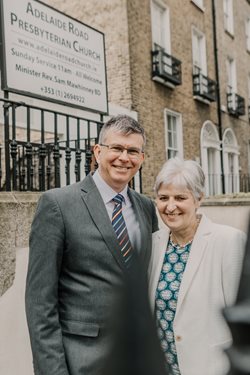 Sam Mawhinney has ministered to this congregation since 2008. Born and raised in Ballycastle, Sam has been ministering in the Republic of Ireland since arriving in the mission outpost of Clonmel in 1997. And at this year’s General Assembly he will become the first Moderator from the 26 counties since Trevor Morrow held the position in 2000.
Sam Mawhinney has ministered to this congregation since 2008. Born and raised in Ballycastle, Sam has been ministering in the Republic of Ireland since arriving in the mission outpost of Clonmel in 1997. And at this year’s General Assembly he will become the first Moderator from the 26 counties since Trevor Morrow held the position in 2000.
I met him in his church office in March, a few weeks after discovering this news. The first thing he had to share with me was his own sense of startlement: “The fact that I got the job was actually quite shocking.” He had allowed his name to go forward as a nominee from the Republic, but at no point did he think he was going to be elected. When we met, arrangements were still being made as he and his congregation adapted to the news and began to welcome it. Having got over the initial surprise, he is now looking forward to the role and the opportunity it will give him to “relate as much as I can about my experiences of working in the Republic and how much I have enjoyed the freedom of it, the Bible-centred nature of it, the non-sectarian context” of ministry here.
…he will be the first Moderator from the 26 counties since …2000.
Sam was raised in a loving Christian home. His father was an elder in the local church. The family attended every Sunday. He loved the CSSM summer programmes that the church hosted. He enjoyed school. He participated in every sport he could. He describes his childhood as “idyllic”. At the age of 15 he felt a need to explore his faith more for himself. He signed up to communicant classes at his church and found that the faith that had been handed down to him was something in which he could trust. “That was a sort of further solidity,” he reflects.
.jpg.aspx?width=300&height=193) After A-levels, he went to Belfast to study Medicine at Queen’s. There, the Christian Union proved to be a further testing ground as he took on positions of leadership and enjoyed firm fellowship with medics and with other students from across the university.
After A-levels, he went to Belfast to study Medicine at Queen’s. There, the Christian Union proved to be a further testing ground as he took on positions of leadership and enjoyed firm fellowship with medics and with other students from across the university.
Through it all, he felt a strong sense of calling to ordained ministry. But with it was an equally strong sense of resistance, worried that his personality was not suited to a role in the spotlight and concerned about being able to live up to such a high vocation. In retrospect, he wonders if studying medicine was not an attempt to bargain with God, as if to say, “How about I just be a missionary doctor instead?” Ultimately, he heeded the call, but did not give up on the idea of serving as a missionary doctor, spending a year in a Presbyterian Church of East Africa hospital in Kikuyu, outside Nairobi in Kenya. It was back in Belfast, studying Theology, that he met Karen, a nurse, who he would go on to marry.
Their first destination in the Republic was the rural setting of Clonmel, a small town in Tipperary. It was a baptism of fire. As he remembers it, “that was difficult”, before quickly adding “– not because Clonmel per se was difficult”. But it was a project conceived in the very early stages of the denomination’s modern turn towards church planting and the ingredients for success were not present. “We had no island of strength, we had no building, we had no presence… I was parachuted in there.” PCI has learned so much in the intervening decades, with successful projects such as Maynooth and Donabate to refer to. A lot of approaches were taken then “that just wouldn’t happen today”.
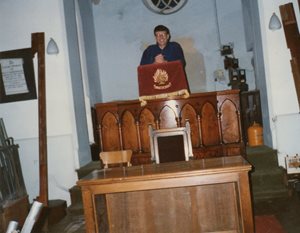 After three years in Clonmel he moved south to Fermoy in County Cork and things got much easier. “We had a building, even though it was derelict. We had a presence there that people could understand.” And when the Church renovated the building, this communicated their wider vision for their presence in the community, and the people of the town welcomed them.
After three years in Clonmel he moved south to Fermoy in County Cork and things got much easier. “We had a building, even though it was derelict. We had a presence there that people could understand.” And when the Church renovated the building, this communicated their wider vision for their presence in the community, and the people of the town welcomed them.
The number of people who have been blessed by the church is truly substantial…It is a hub of mission at the heart of the city.
As much as these years had difficulties, Sam and Karen enjoyed their time in Tipperary and Cork. But it was a culture shock to realise “just how weak we were as a denomination”. Coming from the Presbyterian heartlands of Ulster, it was hard to adapt to a situation where they had no standing and were reliant on people’s hospitality to get even basic ministries off the ground. But that sense of having to build from scratch also brought with it a kind of liberation.
Instead of replicating a giant ecclesial infrastructure, the work they have done is based much more in getting to know people, teaching the Bible informally and becoming invested in the community. “If I met anybody, I just talked to them,” Sam says. What he found was that people loved to chat – about the GAA and the stories in the local newspaper, and often about Jesus as well. “There isn’t that angst of sectarian sensitivities about talking to people… There’s more interest in debating the things of faith and religion and more openness about what they do or don’t believe. I’ve always appreciated that.”
.jpg.aspx?width=250&height=330) The context of Dublin’s south inner city is different in that he cannot operate with quite the same vision – Fermoy was his parish in a way that the capital city cannot be. And Irish culture has changed dramatically in the last 20 years. But that sense of liberation that comes from being a minority persists. Presbyterians account for about 0.5% of the population in the Republic. Adelaide Road might be strong within itself, but the scale of the work remains daunting.
The context of Dublin’s south inner city is different in that he cannot operate with quite the same vision – Fermoy was his parish in a way that the capital city cannot be. And Irish culture has changed dramatically in the last 20 years. But that sense of liberation that comes from being a minority persists. Presbyterians account for about 0.5% of the population in the Republic. Adelaide Road might be strong within itself, but the scale of the work remains daunting.
Daily reading of Scripture forms the basis of his spiritual practice. Sam recounts a profound experience he had on his 30th birthday, reading Jeremiah 1. That morning, the call to be a prophet to the nations resonated powerfully with him, in a way he remembers still. Now, a few decades later, he realises that this is his reality in Adelaide Road. The church is rooted in a particular location but it ministers across the globe through the diversity of the congregation.
Worship might be led by someone from Korea while the Bible is read by someone from Monaghan. Refugees sit beside tech executives. People come and join for a season and then leave again as studies or contracts prompt them to move. They hear of former members who spent a season with them leading dynamically in student ministries in Australia, and of people who first got involved in the church through its international café becoming members of the Church in China. The number of people who have been blessed by the church is truly substantial. On more than one occasion, Sam has found himself travelling and bumping into people who he discovers were once members of Adelaide Road. It is a hub of mission at the heart centre of the city.
His personal position does not hinder him…from recognising, working with and even celebrating the work of his fellow ministers who are women.
Holding such diversity together can be a challenge, but it is one Sam relishes. “It’s not because I’m here; it’s because there’s a lot of people doing the welcoming!” One element of the life of the church that he appreciates particularly is the way that the community of young adults are so passionate about their Christian discipleship. “They actually have their birthday parties here; they spend their Saturday nights here.” Even these informal get-togethers become a context for mission. “That’s the most exciting thing – the diversity and openness of people that are here.”
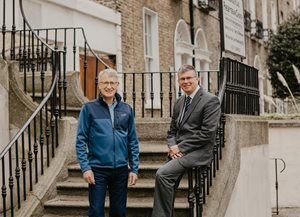 Based on the impression created by the first media engagements after Sam’s election, such an openness to diversity might come as a surprise. Asked about his personal position on women’s ordination, Sam explained that he holds a “complementarian” perspective, whereby men and women are considered equal but are called to distinctive roles. If he could go through that process again, he says he would be “much more conscious” that “the role of the Moderator is not about my personal opinion but about the position of the Presbyterian Church in Ireland”.
Based on the impression created by the first media engagements after Sam’s election, such an openness to diversity might come as a surprise. Asked about his personal position on women’s ordination, Sam explained that he holds a “complementarian” perspective, whereby men and women are considered equal but are called to distinctive roles. If he could go through that process again, he says he would be “much more conscious” that “the role of the Moderator is not about my personal opinion but about the position of the Presbyterian Church in Ireland”.
His personal position does not hinder him, however, from recognising, working with and even celebrating the work of his fellow ministers who are women. He works closely with women in the presbytery and would work with women as elders. My wife – who served for years as a prison chaplain – can testify to Sam’s sincere and meaningful encouragement and support. When he says that his secondary concerns do not outweigh his primary desire for unity with everyone who sees Christ as Lord, you end up hearing a message too complicated to fit into any headline, soundbite or tweet.
Firmly holding the mirror position on this important question, I have found Sam to be the opposite of hostile. He is a friend from whom I learn in our disagreements. He understands that his position is nuanced and might be easily misunderstood but he intends to serve as a Moderator for all the Church’s membership. Throughout his ministry, he has worked with the tension of his personal conscience and his much more fundamental public conviction about the good of the church – “I would never elevate this to a point where I would not accept the ministry of a woman or not participate with them”.
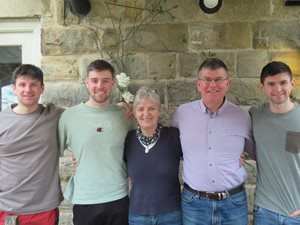 Sam is clearly bruised by his first media encounters. He accepts that his words have hurt people and will endeavour to be “a representative for the whole Church”. But he also would love to see the level of discourse in the denomination – about this issue and others as well – raised so that we recognise that stark binary options do not fit anyone. Understanding why people arrive at the positions they hold is as important as knowing where they stand and often allows common ground to be discovered. “We label people so easily and people are always more complicated than the camp they find themselves in.”
Sam is clearly bruised by his first media encounters. He accepts that his words have hurt people and will endeavour to be “a representative for the whole Church”. But he also would love to see the level of discourse in the denomination – about this issue and others as well – raised so that we recognise that stark binary options do not fit anyone. Understanding why people arrive at the positions they hold is as important as knowing where they stand and often allows common ground to be discovered. “We label people so easily and people are always more complicated than the camp they find themselves in.”
Holding these finely balanced views together is possible, for Sam, because “the missional context in the Republic of Ireland simplifies everything”. No church is strong enough to stand on its own and that generates a “sense of collective unity” that might be instructive for the wider Church as it faces difficult years ahead. Even in the North, “we are increasingly becoming weaker, but I think we need to see that as an opportunity”. When we are stripped of the support structures of cultural relevance, we are freed to discover new ways of being confident in Christ, comfortable in diversity and open to how God might do new things. If he does settle on a slogan for his year as Moderator, “the idea of being confident in Christ” will be at the fore, because the church still has a good deal to offer this society in terms of both truth and community.
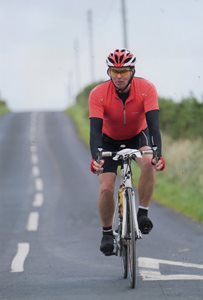 Sam and I are avid cyclists – indeed, we both arrived on two wheels to our meeting. Fitting for its inner-city location, Adelaide Road Presbyterian Church has some of the finest bike-parking facilities I have ever found at a church. Asked if promoting such developments would be part of his mandate as minister, he laughed. He agreed with me that he would not be the Greta Thunberg of PCI, but he granted that we must remember that environmental care is part of the Christian life. “We need to live as God has mandated us to live, respecting the resources that he has given us.”
Sam and I are avid cyclists – indeed, we both arrived on two wheels to our meeting. Fitting for its inner-city location, Adelaide Road Presbyterian Church has some of the finest bike-parking facilities I have ever found at a church. Asked if promoting such developments would be part of his mandate as minister, he laughed. He agreed with me that he would not be the Greta Thunberg of PCI, but he granted that we must remember that environmental care is part of the Christian life. “We need to live as God has mandated us to live, respecting the resources that he has given us.”
He knows what it is like to minister in the most rural of contexts as well as the most urban
Sam Mawhinney is a man from Co Antrim utterly at home in the Republic. He is the minister of a church that stands for the long heritage of Presbyterianism in Dublin city and that has membership from all over the world. He knows what it is like to minister in the most rural of contexts as well as the most urban. He holds firm to his own convictions while being open to difference. It is entirely understandable if all his complexity doesn’t fit into a nice soundbite. In these regards, he is a fitting representative leader for our denomination for the coming year.
Photos: Dr Mawhinney and his wife Karen in Dublin and with David Boyd, Adelaide Road Presbyterian Church's Irish Mission worker (credit Jamie Trimble) From the family album: Dr Mawhinney in Kenya and in the pulpit of Cahir Presbyterian Church in County Tipperary where he was minister of the joint charge with Fermoy Presbyterian in County Cork. The Mawhinney family, Dr Mawhinney and Karen with their sons (left to right) Peter, David, and Andrew, plus keeping fit on his bike.
Kevin Hargaden is an elder in Lucan Presbyterian Church. He is a theologian whose work focuses on Christian Ethics. His most recent book is called Parish as Oasis.
The General Assembly will be livestreamed here on this website. All public sessions will also be livestreamed until the Assembly’s close on Saturday, 24 June. You will find the business before the Assembly here and the Reports that will be discussed here. You can follow proceedings live via Twitter @pciassembly using the hashtag #PCIGA23.